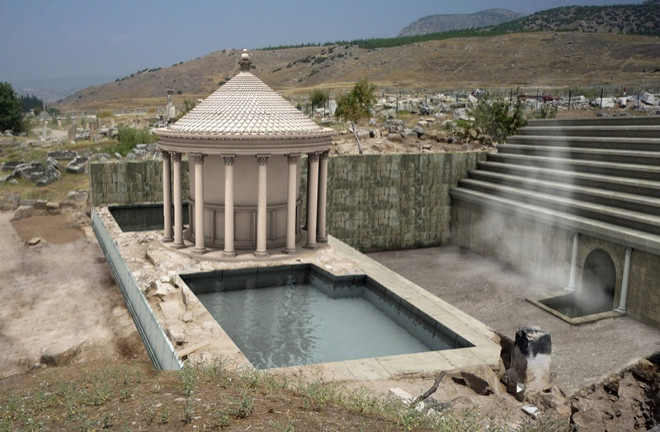Gate To Hell In Turkey: Archaeologists Discover Fabled Portal To The Underworld Filled With Fatal Carbon Fumes In Istanbul

Italian archaeologists have reportedly discovered the fabled Gate to Hell, also known as Pluto’s Gate – Ploutonion in Greek – in southwestern Turkey.
Celebrated as the portal to the underworld in Graeco-Roman mythology and tradition, the ancient mythological cave is believed to be filled with foul-smelling carbon fumes that can cause near instant death.
According to a Discovery News report, historians located the site in the ancient Phrygian city of Hierapolis, which is now called Pamukkale. They described the opening of the cave as filled with lethal mephitic vapors.
"This space is full of a vapor so misty and dense that one can scarcely see the ground. Any animal that passes inside meets instant death," wrote Greek geographer Strabo, who lived between 64 or 63 BC and about 24 AD. "I threw in sparrows and they immediately breathed their last and fell.”
Apart from the cave, the team of archaeologists has discovered a nearby pool where priests used to stay all night to receive visions. In addition to the pool, some stairs, a temple, a column and a dedication to Kore and Pluto, the lords of the underworld, were also unearthed by the archaeologists.
Only the priests were allowed near the opening. Other individuals watched the rituals from the stairs.
However, individuals were permitted to release birds into the opening of the cave to watch them die after they inhaled the lethal fumes. As part of certain rituals, other animals such as bulls were led into the opening and dragged out dead.
The archaeology team, which made the discovery, was led by Francesco D'Andria, professor of classic archaeology at the University of Salento in Italy. They announced the findings at a conference on Italian archaeology in Istanbul, Turkey.
D'Andria, who has been conducting extensive archaeological research at the World Heritage Site of Hierapolis, explained how he and his team found the “Gate To Hell,” which is also called “Plutonium” in Latin.
“We found the Plutonium by reconstructing the route of a thermal spring. Indeed, Pamukkale's springs, which produce the famous white travertine terraces originate from this cave,” said D'Andria, who also revealed that the portal is still as deadly as it was in ancient times.
“We could see the cave's lethal properties during the excavation. Several birds died as they tried to get close to the warm opening, instantly killed by the carbon dioxide fumes,” D'Andria noted.
According to history, the only one who could enter the “Gate To Hell” without any damage were the eunuchs of Cybele, an ancient fertility goddess. "They hold their breath as much as they can," Strabo wrote. The Greek geographer also added that their immunity could have been due to their "menomation," "divine providence" or "certain physical powers that are antidotes against the vapor,” Discovery News reported.
© Copyright IBTimes 2024. All rights reserved.






















